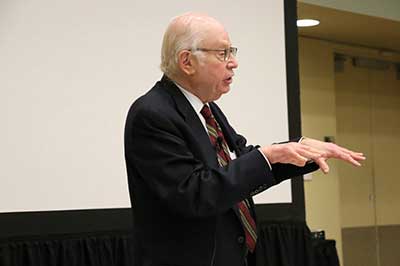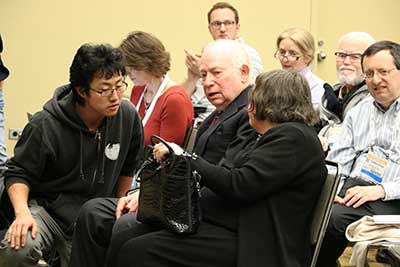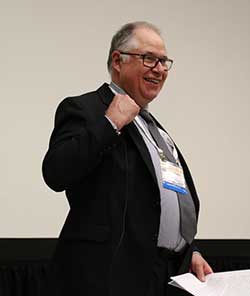Session Report: “The Author in Dialogue: Steven Weinberg’s To Explain the World
By Robert P. Crease

Photo: Courtesy of Tushna Commissariat
Steven Weinberg

Photo: Courtesy of Tushna Commissariat
Weinberg and his wife with a questioner
Well over 500 people attended the March meeting session “The Author in Dialogue: Steven Weinberg’s To Explain the World, with over 100 people standing along the back and side walls of the Baltimore Convention Center’s ballroom. The session raised issues of genuine historical substance. The Nobel Laureate in Physics Steven Weinberg spoke first, then commented after each talk. A line of people formed behind the audience microphone after each speaker finished, though only a few questions could be accommodated.
Joseph Martin introduced the event by pointing out that the FHP organized the session because Weinberg’s book is not only an important book in the history of physics, but has raised a conversation among historians about how the history of science should be done.
Weinberg’s talk was entitled “Reflections of a Whig Physicist.” He spoke concisely, forcefully, and bluntly, kicking up a twitterstorm from among the historians in the audience. Some years ago, he began, he decided he wanted to know more about history of science. He did what professors often do when they need to learn a new subject and taught a course on it, and his notes for the course led to the book. “I knew from the beginning that I was being naughty.” The reason, he said, was that according to traditional historical practice the historian should set aside the history that he or she knows, and “I really couldn’t.” It would be great if we could go back and somehow get into the heads of early scientists, but that’s not possible. However, he continued, “we have a great clue—the planets in the Hellenistic era move the same way that they do now.” Knowing that that helps to understand what the ancient astronomers were thinking. Weinberg also said that he refused to avoid comparing our scientific practices with theirs as if ours were better: “They are better!”
Weinberg then explained his title. The term “Whig history” was coined by the British historian Herbert Butterfield in a book of 1931 to refer to approaches that conceive history as an inexorable march towards the enlightened present. Butterfield warned against “Whig history,” Weinberg said, out of a fear of imposing an “ahistorical moral judgment,” and ever since historians have taken “Whiggish” as a term of abuse, like “racist,” “sexist” or “Orientalist.” But, Weinberg continued, ahistorical moral judgment is not a problem for the history of science. The point of history of science is to learn about how people learned about the world, and there are good and bad ways of learning about the world. Sometimes scientists get hooked on the wrong problem because they are premature, sometimes because they are bad problems. Questions such as “What is the natural place of fire” and “What is the purpose of the stars?” are bad questions because they assume an ontology of the real that’s just wrong. The real story that history of science considers is not what immediate influences acted on particular scientists; that’s not interesting! “The real story is the progress of science from an earlier day when the most intelligent people in the world did not know how to address the mysteries of nature…. It’s a great story, it’s not at an end, but we have learned some things. If we don’t use the things we know [to understand history of science], then the story has no point.”
The first questioner asked if we can turn physics to the study of history. “I thought that’s what I was doing!” he joked, then said that what the questioner probably meant was whether physics could be imitated by history as an intellectual discipline. “I think not,” and great harm can be done by scientism.
Another questioner asked about the role of aesthetics in science, and Weinberg referred to a point he had made in Dreams of a Final Theory. When a scientist describes a theory as beautiful, it’s similar to the way a horse trainer might describe a horse as beautiful. Based on the experience of hundreds of horses, the trainer is picking up on subtle cues that can’t be explained that the horse is a winner.
Someone pointed out that our current theories might be wrong, and that our picture of the universe might be no closer to the truth than that of Plato or Aristotle. Weinberg disagreed. It’s not that Einstein replaces Newton, he said; Einstein’s theory explains why the conceptual foundations of Newton’s theory work. “I see that as progress. Our theories are never wrong, just right for a different reason.” History of science is about that progress. “Things that concern us on human level, and the theories of the nature of the world—these are two very different things. We have learned not to put human values into our physical theories.”
The last questioner able to be accommodated asked Weinberg what ideas might be inhibiting current science. “Not our ideas; our lack of funds.”

Photo: Courtesy of Tushna Commissariat
David Wootton
The second speaker was David Wootton, the Anniversary Professor of History at the University of York. Wootton is the author of the recent book, The Invention of Science, and a winner of the Beller Lectureship, designed to bring distinguished physicists from abroad to present invited talks at APS meetings. Wootton’s talk was entitled, “Is Understanding the Past in Its Own Terms Understanding?” Wootton said that in the first half of his talk he would say where he agreed with Weinberg, and in the second half where he disagreed. Wootton said he agreed with Weinberg on six points. The first is that progress in history of science is real, historians need to write about it, and that can be done without claiming cultural superiority. The second is that the past must be studied not only on its own terms. The third is that it is not always wrong to write history from the point of view of the victors; historical actors sometimes made bad choices and we can’t rescue losers from the condescension of posterity. The fourth is that one of the reasons that historians study science is to understand its success; science is a special and more rational sort of activity. The fifth (which Wootton did not have time to address) is the shortcomings of the Duhem-Quine thesis that theory choice is always underdetermined. The sixth is that theory change is not always contingent and non-rational, and that one can distinguish between “contingent preconditions and path-dependent developments.” Because historians of science have neglected these six points, Wootton said, they have “got themselves into a terrible state of intellectual confusion.”
How, then, should the history of science be written? Wootton’s answer differed from that of Weinberg in three ways, all having to do with what Wootton considers Weinberg’s underestimation of the difference between the past and the present. One example had to do with language. Copernicus never used the word “system,” and the eventual application of that word to the world rather than to a model “encapsulates an intellectual revolution.” Wootton therefore considered Weinberg’s phrase “the solar system explained” as applied to Copernicus an anachronism. A second example had to do with the fact that science is not just a method of collecting facts, but involves a critical community that carries forth the work of its own members. A third example had to do with the key role of certain now-abandoned conceptions in theories, such as the role of the ether in early electromagnetism. Whig history, Wootton concluded, is not very good history and “leads to a misleading picture of science as straightforwardly accumulative rather than periodically revolutionary and destructive.” Nevertheless, Weinberg’s larger project “of understanding how modern science came into existence and how we became so much more effective than previous societies and previous generations in interpreting nature “ is “a perfectly legitimate intellectual enterprise, and if that is Whig history then I too am a Whig historian.”
Following Wootton’s talk Weinberg remarked, “I thoroughly enjoyed the first half of Professor Wootton’s talk.” Faced with the second half, Weinberg said he initially felt a little anxiety, like when you are called before a magistrate, you have no idea why, and you fear you are about to be accused of a serious crime, “then you find you are accused of having a rear light on your car that’s not working.” He defended his phrase “the solar system solved” by saying that Wootton’s critique “passes over the value of alliteration.”
F. Jamil Ragep from McGill University followed Wootton with a talk entitled, “To Explain Copernicus: The Islamic Scientific and Religious Contexts.” The people we historians of science study, Ragep said, are not necessarily aware of what is going to happen to their theories, making the context of discovery is different from the context of reception. He took Copernicus as a case study, pointing out that what motivated Copernicus was not aesthetics, as Weinberg had suggested, but something quite different: the desire to get rid of the equant, which had nothing to do with the heliocentric problem. Ragep also mentioned Islamic scientists who anticipated the idea that the Earth might be moving. He concluded by warning against a disease that a mentor of his called “precursoritis.” Weinberg responded by saying that there’s no question but that Copernicus was influenced by Islamic scientists and their concerns, but that he was interested in how progress happens. “Galileo is not worried about the equant,” Weinberg said, “but about the superiority of the Copernican system.”
The fourth speaker, Will Thomas from History Associates, gave what he called “A Sympathetic Critique of To Explain the World.” Thomas offered two critiques. The first was of Weinberg’s assumption that the Principia was the beginning of the end; that “Newton’s achievements provided the paradigm for what has become modern.” Thomas then offered examples of cases where scientists tried to emulate Newton and failed, such as in chemistry, where interactions were mechanical rather than involving action at a distance. “If anything,” Thomas said, “chemistry and physiology had to break away from Newtonian principles.” Thomas also criticized Weinberg’s claim that, “following the example of Newton’s work, if not of his personal opinions, by the late eighteenth century physical science had becomes thoroughly divorced from religion.” That’s not so, Thomas pointed out. Mainstream scientific opinion embraced a version of intelligent design into the mid-19th century. Such an opinion was even held by Whewell, who coined the word “scientist,” and also by Maxwell. Darwin’s work, Thomas argued, played a key role in breaking the hold religion had over physicists.
Weinberg responded that “the successful part of Newton’s theory was completely naturalistic. It’s not that it drove religion out of the scientists, but it drove religion out of the science.” As to the idea that religion could have a good effect on scientific work, Weinberg said, “Anything can have a good effect on your work—even a good shower.”
The title of the talk of Jennifer Ouellette, from the science and technology blog Gizmodo, was “Getting Whiggy with Science History.” She pointed out that a Whiggish approach to Shakespeare, measuring his plays by our standards, would be terrible; you would miss what was great about the plays. She used this as a preamble to say sympathetic things about the Whig perspective. “The practice of science is different,” she said, and as a science journalist one must treat science differently from other areas of journalism. She proposed a thought experiment involving a Whiggish perspective from 500 years hence on the present, noting that such a perspective from 2516 would get, but also miss, much about the practice of today’s science. She ended with a quote from Will Thomas’s blog: “If we insist that people dare not open their mouths until they have located and mastered an obscure and disorganized body of scholarship, that is the exact same epistemological exclusivity that we tend, in other settings, to object to. We shut ourselves off from what is potentially our most receptive audience, as well as an often-legitimate, if somewhat unruly, source of historical information.” Ouellette concluded by saying that that’s the kind of observation that the session was designed to get across.
Weinberg responded by saying that the story of science is one of the most interesting stories of that of the human species. Who should tell that story—professional historians or professional scientists? “I answered in a recent article in the New York Review of Books: both!”
The articles in this issue represent the views of their authors and are not necessarily those of the Forum or APS.
